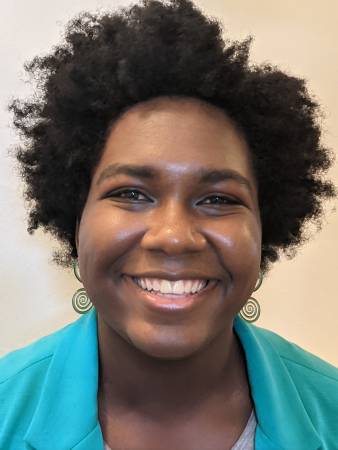MSR Thesis Talk: Tarasha Khurana
Title: Detecting Invisible People Abstract: Monocular object detection and tracking have improved drastically in recent years, but rely on a key assumption: that objects are visible to the camera. Many offline tracking approaches reason about occluded objects post-hoc, by linking together tracklets after the object re-appears, making use of reidentification (ReID). However, online tracking [...]
Carnegie Mellon University
MSR Thesis Talk: Sujay Bajracharya
work, we address the problem of goal-directed cloth manipulation, a challenging task due to the deformability of cloth. Our insight is that optical flow, a technique normally used for motion estimation in video, can also provide an effective representation for corresponding cloth poses across observation and goal images. We introduce FabricFlowNet (FFN), a cloth manipulation [...]
Carnegie Mellon University
MSR Thesis Talk: Edward Chen
Title: Towards Practical Ultrasound AI Across Real-World Patient Diversity Abstract: In the case of high-tempo, traumatic scenarios on the battlefield, real-time ultrasound (US) imaging serves as an enabler for countless possible robotic interventions. Having the ability to automatically segment anatomical landmarks in the body, such as arteries, veins, ligaments, and veins, for percutaneous procedures remains [...]
Carnegie Mellon University
MSR Thesis Talk: Haochen Wang
Title: Audiovisual ontology and robust representations via cross-modal fusion Abstract: The shrill of an ambulance siren and flashing lights, the hum of an accelerating car — important events often come to us simultaneously through sight and sound. We first consider the problem of identifying these events from raw, unlabeled audiovisual data of agents interacting with [...]
Social Navigation with Pedestrian Groups
Abstract: Autonomous navigation in human crowds (i.e., social navigation) presents several challenges: The robot often needs to rely on its noisy sensors to identify and localize the pedestrians in human crowds; The robot needs plan efficient paths to reach its goals; The robot needs to do so in a safe and socially appropriate manner. In [...]
Carnegie Mellon University
MSR Thesis Talk: Viraj Parimi
Title: T-HTN: Timeline Based HTN Planning for Multi-Agent Robots Abstract: Planning in mission-critical systems like deep-space habitats with onboard robotic systems must be robust to unforeseen circumstances. Such systems are expected to complete a set of goals with different deadlines each day for routine maintenance while also accounting for emergencies. With the presence of [...]
Carnegie Mellon University
Robust and Scalable Perception For Autonomy
Abstract: Autonomous mobile robots have the potential to drastically improve the quality of our daily life. For example, self-driving vehicles could make transportation safer and more affordable. To navigate complex environments, such robots need a perception system that translates raw sensory data to high-level understanding. This thesis focuses on two fundamental challenges in learning such [...]
Carnegie Mellon University
MSR Thesis Talk: Yiming Zuo
Title: Towards Self-supervised Object Discovery and Tracking Abstract: Object discovery and multiple object tracking (MOT) are two highly interrelated tasks that are known to be fundamental problems in computer vision, and are crucial for video understanding. Most existing methods rely on supervised training with human annotations, which is laborious and expensive. In this thesis, [...]
Carnegie Mellon University
MSR Thesis Talk: Qiao Gu
Title: Towards Object-generic 6D Pose Estimation Abstract: Pose estimation is a basic module in many robot manipulation pipelines. Estimating the pose of objects in the environment can be useful for grasping, motion planning, or manipulation. However, current state-of-the-art methods for pose estimation either rely on large annotated training sets or simulated data. Further, the long [...]
Carnegie Mellon University
MSR Thesis Talk: Divam Gupta
Title: End-to-End Deep Stereo Layout Estimation Abstract: Accurate layout estimation is crucial for planning and navigation in robotics applications, such as self-driving. In this paper, we introduce the Stereo Bird's Eye ViewNetwork (SBEVNet), a novel supervised end-to-end framework for estimation of bird's eye view layout from a pair of stereo images. Although our network [...]
Carnegie Mellon University
Michael Tasota – MSR Thesis Talk
Title: Design of a Multimodal System for Social Emotional Learning in Early Childhood Classrooms Abstract: As the prevalence of mobile and touch-based devices continues to expand in society, so too does its impact on young children. With educational technologies also on the rise, young children benefit most from those technologies that are designed to [...]
Carnegie Mellon University
MSR Thesis Talk: Aaron Huang
Title: End-to-End Methods for Autonomous Driving in Simulation Abstract: Fully autonomous driving is considered one of the grand challenges of modern technology and a variety of approaches have emerged for creating and evaluating autonomous driving agents. The self-driving industry typically adopts a modular software architecture and uses large fleets of autonomous vehicles for data [...]
Carnegie Mellon University
MSR Thesis Talk
Title: Retrieval-based Novel Activity Detection in Untrimmed Videos Abstract: Accurately detecting activities in untrimmed videos is a challenging task as systems need to handle variance in object scales, multiple viewpoints, and multiple types of activities. Furthermore, in a real-world scenario, activity detectors are often required to detect novel kinds of activities when the need [...]
Carnegie Mellon University
Semantic Mapping for Autonomous Navigation and Exploration
Abstract: The last two decades have seen enormous progress in the sensors and algorithms for 3D perception, giving robots the means to build accurate spatial maps and localize themselves in them in real time. The geometric information in these maps is invaluable for navigation while avoiding obstacles, but insufficient, by itself, for robots to robustly [...]
Carnegie Mellon University
MSR Thesis Talk: Howard Coffin
Title: Mutual Information Maps for Single and Multi-Target Ergodic Search Abstract: This thesis addresses use of multi-agent systems to perform autonomous search for moving targets. Target search has many applications, including search and rescue and surveillance, but most robotic systems used in these situations require human operators. Recent works have used ergodic search methods to [...]
Carnegie Mellon University
MSR Thesis Talk: Wanwen Chen
Title: Ultrasound-based Needle Tracking and Lateral Manipulation Planning for Common Needle Steering Abstract: Many medical interventions require inserting a needle towards the desired site. Robotic needle insertion can potentially provide reliable needle access independent of practitioner experience and availability. However, when the needle is inserted into heterogeneous tissue, the complicated needle-tissue interaction introduces multiple challenges [...]
Carnegie Mellon University
MSR Thesis Talk: Rohit Garg
Title: Coordinated Aerial Exploration of Subterranean Voids Abstract: Subterranean exploration has been thrust into the spotlight by the recent DARPA Subterranean Challenge. Teams are tasked with developing a multi-agent system that can rapidly navigate through unknown underground environments while sending back maps and other semantic information. A system with such capabilities has a wide [...]
Carnegie Mellon University
MSR Thesis Talk: Harvey Shi
Title: The design of a compact laser scanner and an integrated simulation environment for smart manufacturing Abstract: Advanced manufacturing is on the rise with the notable progress in the additive and hybrid manufacturing field. However, most of the existing solutions are open loop without sensory feedback because of the lack of a small form factor [...]
Carnegie Mellon University
MSR Thesis Talk: Daqian Cheng
Zoom link: https://cmu.zoom.us/j/99726348928?pwd=azlicW9qZk1Nc3BkQXBLT2d6djVBQT09 Meeting ID: 997 2634 8928 Passcode: 136122 Title: SLAM with Laser Profilers for High Definition Mapping in Confined Spaces Abstract: Three-dimensional reconstruction in confined spaces is important for the manufacturing of aircraft wings, the inspection of narrow pipes, the examination of turbine blades, etc. It is also challenging because confined spaces tend [...]
Carnegie Mellon University
MSR Thesis Talk: Quint Hester
Title: Graph Neural Networks for Wind Farm Yaw Optimization Abstract: In order to mitigate the effects of climate change, it is important to maximize the power output of our wind energy resources. Wind farm control is typically greedy, with all turbines facing directly into the wind. Due to wake interactions, this leads to reductions [...]
Carnegie Mellon University
MSR Thesis Talk: Henry Zhang
Title: On Visual-Aided LiDAR-Inertial Odometry System in Challenging Subterranean Environments Abstract: Simultaneous Localization and Mapping (SLAM) is one of the fundamental components for autonomous robotic exploration. The goal of SLAM is to create an accurate map for the environment and provide robust state estimation for planning, control, and perception tasks. However, due to the [...]
Carnegie Mellon University
Efficient Robot Decision-Making for Achieving Multiple Independent Tasks
Abstract: We focus on robotics applications where a robot is required to accomplish a set of tasks that are partially observable and evolve independently of each other according to their dynamics. One such domain that we target in this work is decision-making for a robot waiter waiting tables at a restaurant. The robot waiter should [...]
MSR Thesis Talk: Ryan Darnley
Title: Communication Network Flow Control With LQR and Factor Graphs Abstract: Advances in the estimation and more recently the controls communities have leveraged the use of factor graphs to overcome problems of scalability and runtime in dynamical systems. In continuation of that work, we look to use factor graphs to perform LQR control on [...]
Carnegie Mellon University
MSR Thesis Talk: Shirsendu Halder
Title: Robust 3D reconstruction in noisy environments Abstract: Automated inspection in industrial manufacturing can minimize the total production cost of a part. Current inspection solutions often involve measuring a part manually, which interrupts the machining process. We present two non-contact real-time systems which integrate visual inspection in-line with CNC (computer numerical control) machines and ensures [...]
MSR Thesis Talk: Tejus Gupta
ZOOM Link: https://cmu.zoom.us/j/2388465851 Meeting ID: 238 846 5851 Google calendar invite link Title: Adaptive and Efficient Models for Intent Recognition Abstract: Assistive robots should have the ability to understand the intent of humans, predict their behavior, and plan to provide anticipatory assistance in complex real-life environments. In this thesis, we present adaptive and efficient algorithms for recognizing [...]
Carnegie Mellon University
MSR Thesis Talk: Siddharth Agrawal
Title: Learning to Imitate, Adapt and Communicate Abstract: For AI agents to co-exist with humans, they need to be able to learn from us humans, adapt to any perceived changes in our behavior, and communicate in a manner that is easily interpretable. In this work, we investigate the following 3 subproblems: Imitation Learning, Adaptation in Human-Agent [...]
Carnegie Mellon University
MSR Thesis Talk: Danny Vedova
Link: https://cmu.zoom.us/j/92810207130?pwd=blphbkovYVA2b1VoSmhuZ0h2bFRzZz09 Meeting ID: 928 1020 7130 Passcode: 721620 Title: Design and Analysis of a Control Pipeline for a Manipulator in Space Abstract: Many satellites are rapidly reaching the end of their lifespans, and risk de-orbiting if no action is taken. One common problem satellites face towards the end of their lifespans is that they are running [...]
Carnegie Mellon University
MSR Thesis Talk: Fan Jia
Zoom Link: https://cmu.zoom.us/j/9793644214?pwd=enpab3dPc0FBWVdqWDNrcVlabUJCZz09 Meeting ID: 979 364 4214 Passcode: 304453 Title: Trust-Aware Behavior Reflection for Robot Swarm Self-Healing Abstract: The deployment of robot swarms is influenced by real-world factors, such as motor issues, sensor failure, and wind disturbances. These factors cause the appearance of faulty robots. In a decentralized swarm, sharing incorrect information from faulty robots will lead to [...]
Carnegie Mellon University
MSR Thesis Talk: Tejas Zodage
Meeting Link: https://cmu.zoom.us/j/2427727031 Title: Point Cloud Registration as a Classification Problem Abstract: Point Cloud Registration(PCR) is an important step in fields such as robotic manipulation, augmented and virtual reality, SLAM, etc. In the context of computer vision, registration, in general, refers to the process of aligning data obtained from different frames, and as the [...]
Carnegie Mellon University
Decentralized Navigation of Quadrotor Teams in Uncertain Workspaces
Abstract: A fundamental requirement for realizing scalable and responsive real-world multi-robot systems for time-sensitive critical applications such as search and rescue or building clearance is a motion-planning and coordination framework that exhibits three essential properties. The first property is safety that encompasses aspects relating to kinodynamic feasibility and collision-avoidance. The second property is reliability that [...]
Control of Robots with Nonstationary Dynamics
Abstract: Robots can be constructed with fewer resources and less strict constraints than is generally believed. Soft robots can be constructed with very few parts and from a wide variety of materials. This makes them a potentially appealing choice for applications where there are resource constraints on system fabrication. However, soft robot dynamics are difficult [...]
Carnegie Mellon University
Bayesian Models for Science-Driven Robotic Exploration
Abstract Planetary rovers allow for science investigations at remote locations. They have traversed many kilometers and made major scientific discoveries. However, rovers spend a considerable amount of time awaiting instructions from mission control. The reason is that they are designed for highly supervised data collection, not for autonomous exploration. The exploration of farther worlds will [...]
Open Challenges in Sign Language Translation & Production
Abstract: Machine translation and computer vision have greatly benefited of the advances in deep learning. The large and diverse amount of textual and visual data have been used to train neural networks whether in a supervised or self-supervised manner. Nevertheless, the convergence of the two field in sign language translation and production is still poses [...]
The Search for Ancient Life on Mars Began with a Safe Landing
Abstract: Prior mars rover missions have all landed in flat and smooth regions, but for the Mars 2020 mission, which is seeking signs of ancient life, this was no longer acceptable. To maximize the variety of rock samples that will eventually be returned to earth for analysis, the Perseverance rover needed to land in a [...]
Meshlet Primitives for Dense RGB-D SLAM in Dynamic Environments
Abstract: Dense RGB-D SLAM has been well established as a method for achieving robust localization while providing high quality dense surface reconstruction. However, despite significant progress, dense RGB-D SLAM has remained difficult to achieve on computationally constrained platforms, such as those used on autonomous aerial vehicles. A significant limiting factor in the current state of [...]
3D Recognition with self-supervised learning and generic architectures
Abstract: Supervised learning relies on manual labeling which scales poorly with the number of tasks and data. Manual labeling is especially cumbersome for 3D recognition tasks such as detection and segmentation and thus most 3D datasets are surprisingly small compared to image or video datasets. 3D recognition methods are also fragmented based on the type [...]
Carnegie Mellon University
Heuristics for routing and scheduling of Spatio-temporal type problems in industrial environments
Abstract: Spatio-temporal problems are fairly common in industrial environments. In practice, these problems come with different characteristics and are often very hard to solve optimally. So, practitioners prefer to develop heuristics that exploit mathematical structure specific to the problem for obtaining good performance. In this thesis, we will present work on heuristics for 3 different [...]
Computational Light Transport with Interferometry
Abstract: Optical interferometry is the measurement of small, sub-wavelength distances by exploiting the wave nature of light. Due to its capability to resolve micron-scale displacements, it has found widespread applications in biomedical imaging, industrial fabrication, physics, and astrophysics. In this thesis, we introduce a set of techniques we call computational interferometry, that bring the benefits [...]
Rapid Adaptation for Robot Learning
Abstract: How can we train a robot to generalize to diverse environments? This question underscores the holy grail of robot learning research because it is difficult to supervise an agent for all possible situations it can encounter in the future. We posit that the only way to guarantee such a generalization is to continually learn and [...]
Carnegie Mellon University
3D Reconstruction using Differential Imaging
Abstract: 3D reconstruction has been at the core of many computer vision applications, including autonomous driving, visual inspection in manufacturing, and augmented and virtual reality (AR/VR). Despite the tremendous progress made over the years, there remain challenging open-research problems. This thesis addresses three such problems in 3D reconstruction. First, we address the problem of defocus [...]
Robotic Cave Exploration for Search, Science, and Survey
Abstract: Robotic cave exploration has the potential to create significant societal impact through facilitating search and rescue, in the fight against antibiotic resistance (science), and via mapping (survey). But many state-of-the-art approaches for active perception and autonomy in subterranean environments rely on disparate perceptual pipelines (e.g., pose estimation, occupancy modeling, hazard detection) that process the same underlying sensor data in [...]
Humans, hands, and horses: 3D reconstruction of articulated object categories using strong, weak, and self-supervision
Abstract: Reconstructing 3D objects from a single 2D image is a task that humans perform effortlessly, yet computer vision so far has only robustly solved 3D face reconstruction. In this talk we will see how we can extend the scope of monocular 3D reconstruction to more challenging, articulated categories such as human bodies, hands and [...]
Enabling Grounded Language Communication for Human-Robot Teaming
Abstract: The ability for robots to effectively understand natural language instructions and convey information about their observations and interactions with the physical world is highly dependent on the sophistication and fidelity of the robot’s representations of language, environment, and actions. As we progress towards more intelligent systems that perform a wider range of tasks in a [...]
Looking behind the Seen in Order to Anticipate
Abstract: Despite significant recent progress in computer vision and machine learning, personalized autonomous agents often still don’t participate robustly and safely across tasks in our environment. We think this is largely because they lack an ability to anticipate, which in turn is due to a missing understanding about what is happening behind the seen, i.e., [...]















